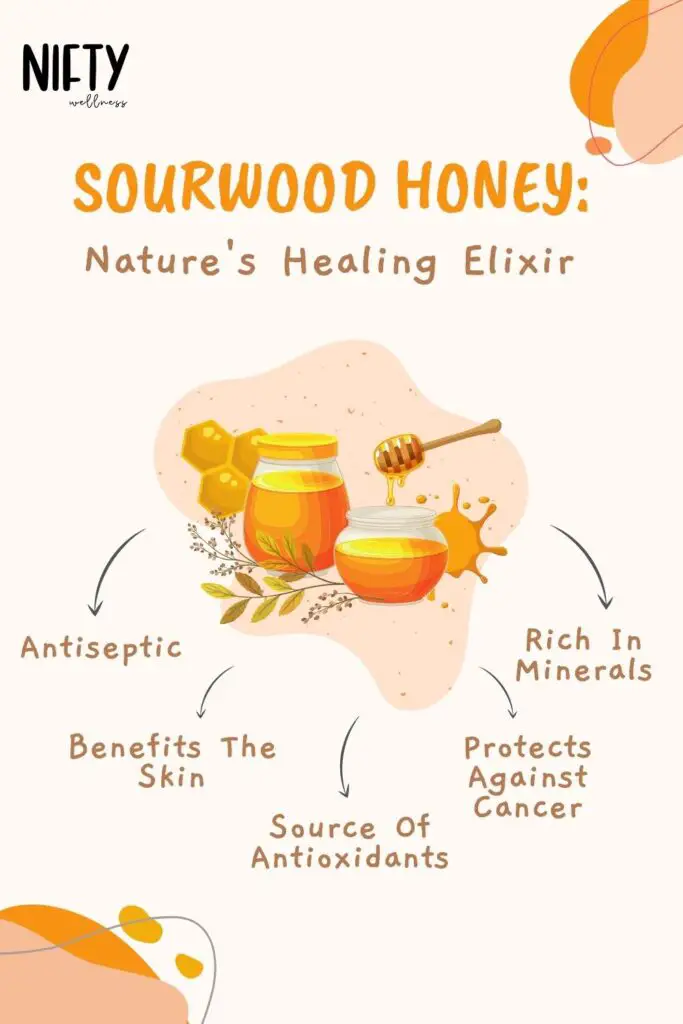Sourwood honey is one of the most unique and sought-after kinds of honey in the world.
This mono-floral honey comes from the nectar of the flower of the sourwood tree, a tree that grows in the Appalachian Mountains of North Georgia, North Carolina, and certain parts of Tennessee.
The sourwood flowers only bloom for six weeks out of the year, from mid-June to late July.
The name of the sourwood tree, known botanically as Oxydendrum arboreum, comes from its sour, acidic odor and flavor of the leaves. Oxydendrum comes from the Greek term “oxy,” meaning sharp or acid, and “dendrum,” meaning tree.
This slim, beautiful tree can grow anywhere from thirty to sixty feet tall. In the summer, it sports white bell-shaped flowers that grow in clusters known as “angel fingers.”

These fragrant floral clusters will beautifully droop and dangle from the branches, similarly to lilies-of-the-valley. At the beginning of fall, its ordinarily dark green leaves turn bright crimson red and purple.
What Is Sourwood Honey?
Sourwood honey is a delectable and highly sought-after honey that originates from the nectar of the sourwood tree, scientifically known as Oxydendrum arboreum. This tree is predominantly found in the southeastern United States, particularly in the Appalachian region. What makes sourwood honey truly special is its unique and complex flavour profile. It is celebrated for its rich, sweet taste with a hint of spiciness and a pleasant, lingering aftertaste.
The honey’s colour can vary from light amber to dark amber, and it often has a crystal-clear appearance. Sourwood honey is a favourite among honey connoisseurs. It is prized for its rarity and the fact that the sourwood tree’s nectar flow is relatively brief, making this honey a limited seasonal delicacy. It’s a versatile sweetener that pairs wonderfully with various foods and beverages, from drizzling it over biscuits and pancakes to sweetening tea and desserts, making it a treasured regional specialty and a delightful addition to culinary experiences.
The Scarcity Of Sourwood Honey


Sourwood honey is prized by honey connoisseurs all over the world and has twice won the award for “best honey in the world” at the 2005 and 2007 Apimondia World Honey Show.
This artisanal, single-source honey is produced only in several states in the southeastern, mountainous regions of the United States. Yet, despite its prestige, it is often in short supply.
Sourwood trees can go years between harvests, in part due to weather and land development.
Lower than average rainfall and temperatures influence bees and the sourwood tree’s already short flowering period. Land development and deforestation in the natural landscapes supporting the sourwood tree have also affected its supply.
The sourwood honey supply also depends on elevation, as those trees higher in the mountains produce more honey than those in the foothills.
Check out our blog Chesa Fruits: Nutrition & Benefits Of The Infamous Eggfruit. Welcome to the realm of natural nourishment and well-being as we unravel the wonders of chesa fruits.
The Taste Of Sourwood Honey


Despite its name, sourwood honey is not sour at all. It has a sweet, rich taste of raw honey with subtle notes of caramel, maple, anise, spice, and florals.
Sourwood honey is exceptionally aromatic and has a long-lasting sweet aftertaste described as a spicy gingerbread flavor. Its liquid-smooth texture will melt on your tongue.
One extra benefit of sourwood honey is that its light amber color is slow to crystallize and will last a long while in your pantry!
This also makes sourwood honey an excellent sugar alternative for baked goods such as cakes, sweetbreads, and cookies.
(Check out acacia honey for another light amber honey.)
Health Benefits Of Sourwood Honey


Honey has been consumed and used by humans for thousands of years. Raw honey is hailed for its health and medicinal values, and sourwood honey is no exception.
Sourwood honey is packed full of vitamins, minerals, amino acids, and antioxidants that protect the body and keep it functioning properly. Sourwood is also anti-inflammatory and antibacterial.
Its unique properties can soothe a sore throat, calm digestive issues, and promote overall well-being, making sourwood honey a valuable addition to your pantry for its taste and potential health-boosting effects.
Source Of Antioxidants
Sourwood honey is a rich source of antioxidants and has very high free radical scavenging activity.
Sourwood is said to have more antioxidant power than Manuka and buckwheat honeys; it contains several productive antioxidant compounds such as flavonoids and phenolic acids that protect the body against harmful oxidation and cellular damage.
Flavonoids make a great addition to any diet as they protect the body against everyday toxins and decrease your risk of developing several chronic health conditions.
Likewise, phenolic acids showcase tremendous antioxidant activity, according to a 2019 study, significantly reducing your likelihood of developing oxidative stress related diseases.
Benefits The Skin

The raw, enzymatic power of sourwood honey benefits the skin by healing wounds, scars, and scrapes.
Sourwood honey also provides the skin with vitamins, antioxidants, amino acids, protects against bacterial and fungal infections, and moisturizes the skin.
Propolis, a compound known as “bee glue,” is the resinous, sticky substance accumulated by bees from different plants during the honey-making process.
Propolis is widely used in skincare for its anti-inflammatory, antioxidant, antibacterial, antifungal, wound-healing, collagen-boosting properties.
You can apply sourwood honey directly to the skin to help treat and soothe acne, scars, psoriasis, eczema, as well as to brighten and condition the skin.
Antiseptic
Sourwood honey is a fantastic natural antiseptic commonly used to treat allergies, colds, and other flu-like symptoms. The smooth texture of sourwood honey can also be used to soothe the throat.
At the same time, its natural antioxidants, minerals, antibacterial, antimicrobial, and anti-inflammatory properties kick in to aid the immune system. These qualities make sourwood honey a delicious sweetener and a soothing remedy for various ailments, a true gift from nature.
Protects Against Cancer

Sourwood honey’s high antioxidant levels fight damaging free radicals and may protect the body against the development of critical health conditions such as cancer.
One study examining honey as a natural anti-cancer agent found that honey’s antioxidants, along with its anti-inflammatory, antimutagenic, non-carcinogenic, and immune-boosting activities, make it a positive agent for preventing cancer.
In addition to its antioxidants, sourwood honey’s propolis has shown potential as a natural cancer treatment for human breast cancer due to its antitumor activities.
Propolis has also shown promise in treating lung cancer and melanoma by minimizing cancer cell proliferation.
Rich In Minerals
Honey is a rich source of raw minerals, though the mineral content varies depending on the absorption of minerals by the plants from the soil and surrounding environment.
Sourwood honey contains trace elements such as calcium, zinc, magnesium, iron, phosphorus, potassium, and copper.
In one study comparing the contents of several honey types, sourwood honey was found to have the highest potassium, magnesium, and sodium concentration.
Together, these minerals are beneficial for your body’s overall health and functioning, playing a pivotal role in several processes such as energy production, blood sugar levels, and hydration.
Read our blog Myomin Benefits & Side Effects: Is It Powerful. Learn how Myomin benefits your body and assists in achieving optimal well-being.
Conclusion
In wrapping up, let’s reflect on sourwood honey’s unique qualities. It’s a sought-after delicacy from the Appalachian Mountains, known for its limited supply due to specific growing conditions. The taste? Well, it’s a delightful combination of sweetness with a long-lasting, liquid-smooth texture, making it a versatile addition to your pantry. But what sets it apart are the health benefits – loaded with vitamins, minerals, antioxidants, and anti-inflammatory properties. It’s not just a sweet treat; it can do wonders for your skin, bolster your immune system, and may even offer protection against conditions like cancer. Nature’s goodness at its best!
Frequently Asked Questions

What Goes Well With Sourwood Honey?
Sourwood honey is a great natural, raw sweetener that pairs well with nearly everything.
You can use sourwood honey to sweeten tea, cheese, fruit, oatmeal, granola, pancakes, waffles, biscuits, and other recipes.
Sourwood is also the perfect honey for Southern cooking and is often used in barbeque, cornbread, grilled peaches, and so on.
What Is The Best Environment For Producing Sourwood Honey?
Sourwood honey is a mono-floral honey, and its nectar supply depends on several conditions, such as weather.
If the weather conditions are too cold and wet, the sourwood tree may not produce enough flowers and nectar to produce a mono-floral honey.
Sourwood trees have their most generous yields when the Appalachian region experiences a hot, arid summer.
How Do Bees Produce Sourwood Honey?
As the honey bees collect the sourwood nectar from their flowers, the nectar mixes with an enzyme in the bees’ mouth known as invertase.
This enzyme slowly works to reduce the water content in the nectar, converting it into honey.
Is Sourwood Honey Vegan?
All types of honey, including sourwood honey, are not considered to be vegan.
Is Sourwood Honey Expensive?
Because of sourwood trees’ sensitivity to weather conditions, sourwood honey supplies could be limited given the year.
Based on the yearly yield, the honey’s purity, and the seller, sourwood honey can be bought anywhere from $8 a pound to $40 a pound.
Does Sourwood Honey Crystallize?
Most types of honey crystallize, depending on the stability of their sugar to water ratio. Pure sourwood honey is very slow to crystallize and may never become solid, depending on its fructose content.
What Does Sourwood Honey Look Like?
Sourwood honey is a beautiful light amber color and has a smooth, liquid, syrupy texture that rarely crystallizes.
